In May 2019, Tom Boyd stunned the competition by retiring from football. He tells CALLUM DICK how he managed to rediscover his love footy despite not having fun at the top level.
This week marks 10 years since Tom Boyd was traded from the GWS Giants to the Western Bulldogs on an eye-watering seven-year, $7 million deal.
Before the era in which million dollar deals were commonplace, Boyd’s blockbuster move less than one year into his career became the biggest story in football.
Like Bailey Smith this week, Boyd’s name dominated the headlines a decade ago as deadline day approached and the two clubs played cat and mouse on whether or not the 2013 No. 1 pick would remain in western Sydney or return home to Melbourne.
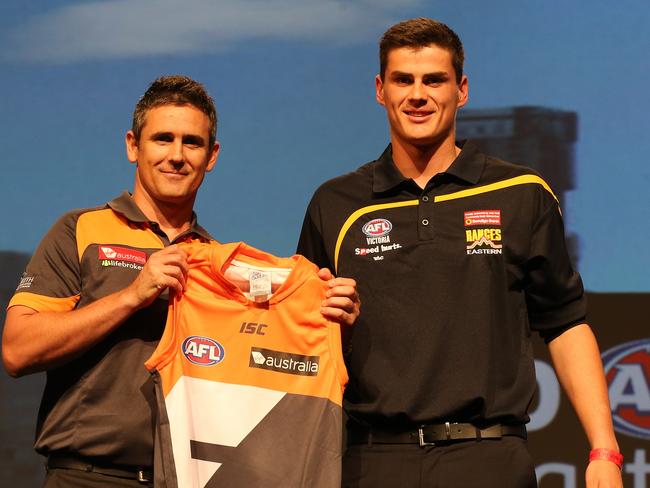
Thankfully his move was signed, sealed and delivered days before the trade period window slammed shut.
But this year, it took until the final hour for nine players – whose futures had remained in limbo for weeks or months – to finally get some clarity over where they would be playing in 2025.
“I just think back to how much emotion was attached to it as the player who was being traded,” Boyd tells this masthead.
“If you’re (a fan) watching it all happen it is the most boring and non-relevant thing – until something actually happens – that you’ll ever see in the AFL.
“But if you put the human side to it, about who is being traded and how they almost feel like a commodity at the time – if you attach that human element to it – you realise that it can be a life-changing moment for that person, good or bad.”
THE TRADE MEDIA STORM ERUPTS
For Boyd, the media storm that came with his trade request and subsequent move to Melbourne was unlike anything he could have expected.
Every day there were multiple articles from legacy media critiquing each angle of the trade. On social media, people who knew nothing of Tom Boyd the person were suddenly bombarding him with threats and taunts – all because they disagreed with his career decision.
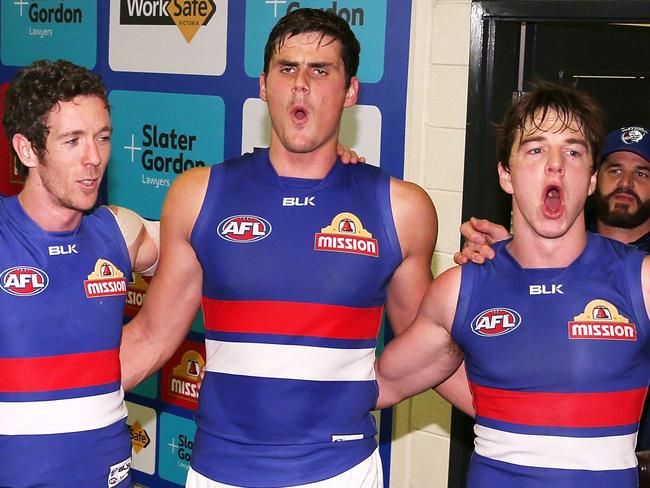
“I had my fair share of people sending me messages that I’ll never repeat,” Boyd recalls.
“Turning that off was actually relatively easy for me. But where I started to have major issues was going to the shops or sitting in a restaurant, where people thought it was OK at that stage to, let’s say, be rude at best.
“That’s what I really struggled with, that human interaction where people had a level of vitriol towards me when they had never met me before.”
Little did those people know that their venomous barbs were like nails in a post for Boyd’s mental health. At the time, not even he knew the extent to which it was impacting him.
A COMPLEX RELATIONSHIP WITH FOOTBALL
Less than five years after his trade to the Bulldogs, Boyd announced his retirement.
In the five years since, his relationship with football and the AFL has been complex.
“I would say for the first year or so after I retired, it was difficult to watch,” he recalls.
“You can imagine being a painter and then once you retire, you decided to go and watch someone else paint walls – it just didn’t make sense to me to go back and watch the same footage I would spend five or six hours a week watching when I was actually playing and had a career in it.”
Since his high-profile retirement in May of 2019, Boyd has slowly rediscovered his love for the game – Australian rules football, that is.
“Slowly over time it became really apparent to me how much I loved what the actual sport of football – as opposed to the league of AFL – had to offer,” he says.
“I went back to community football and saw local games, I played local football in suburban leagues in Melbourne and I really got back to the idea of football being fun. I didn’t have a lot of fun at the top level. I had moments.”
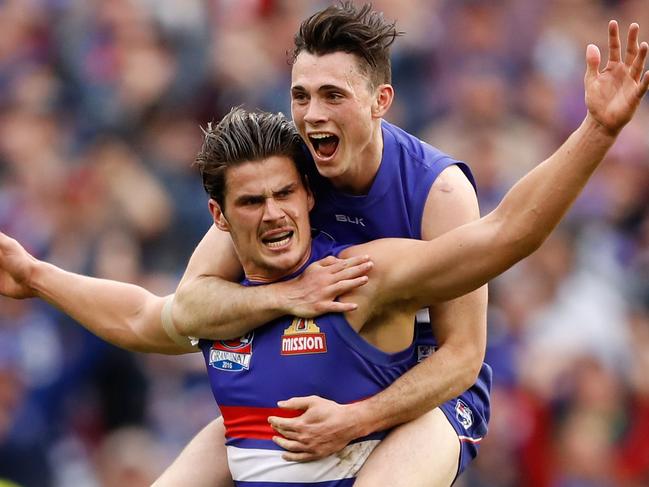
‘HIS PLACE IN BULLDOG HISTORY’
Put simply, the “top level” was a tough time.
As a professional footballer, his legacy will forever be the 2016 preliminary and grand finals – two of the greatest performances of his 61-game career – which helped deliver the Western Bulldogs a drought-breaking premiership.
In the days after Boyd announced his retirement, then-Bulldogs president Peter Gordon told the Herald Sun if not for the 200cm spearhead, the drought would have continued.
“At that stage we were staring – in an away game – at our eighth consecutive preliminary final loss, and we hadn’t made a grand final in 55 years,” Gordon recalled of the 2016 prelim against GWS.
“It’s fair to say but for his (Boyd’s) contribution we probably would have lost and the magic of the next week would never have happened – and, of course, everyone remembers his performance on that day.
“His place in Bulldog history will forever be a great one.”
10 years ago Tom Boyd was traded to the Western Bulldogs. #AFLTradepic.twitter.com/3Ovwh4gVVn
— Daniel Eade (@DanielEade) October 15, 2024
FEELING BROKEN
The AFL was to be the proving ground on which the key forward became a bona fide superstar. But only months into his debut year, Boyd felt broken.
“I got drafted in 2013 – pick one – one of those very lucky and successful kids who did well at school, well off-field, and did well playing football and basketball as a junior,” he recalls.
“I got shipped up from Melbourne to Sydney 10 days after my final school exam. I probably grew up in an era where there was a more balanced approach to overall health.
“Nutrition was important, sleep was important, but mental health as a whole wasn’t something people discussed or that people knew much about. And so in my first season, when I started having issues getting to sleep, I didn’t know why … but I was starting to get more and more fatigued as time went on.
Tom Boyd's got it.
— Matthew McKenzie (@MusicMcKenzie) November 12, 2021
Tom Boyd goes long...
How will it bounce?
The stadium holds its breath...
IT'S A GOAL!
And the western suburbs erupt!! pic.twitter.com/2aQESwakTh
“I started having serious bouts of anxiety, which I just thought was nerves for the next game – even though it was a Tuesday afternoon and we didn’t play until the following weekend.
“As the footy year progressed I started to do what so many people do. I pulled back from things, spent a lot of time on my own, tried to recharge and deal with the occasional low mood and was essentially told at that stage, ‘don’t worry, you’re just homesick. It will eventually go away’.”
Except it didn’t go away.
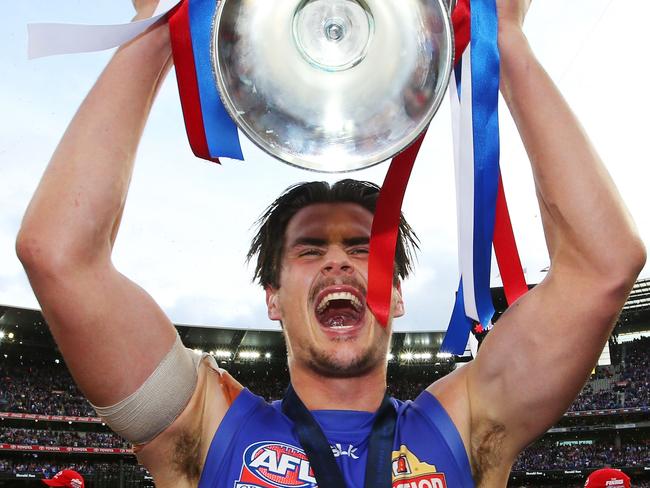
Boyd got his Western Bulldogs wish granted and less than two years later, he was an AFL premiership player. He was one of the game’s highest-paid and highest-profile players and had achieved the ultimate team success at the age of 21.
Publicly he was on top of the world but privately, he was waging a war inside his own head.
“I hadn’t slept in a couple of weeks and I was having incredible bouts of anxiety and low moods – depression – where I really couldn’t find myself seeing what the future looked like,” he says of the 2017 season.
“Finally, after four years pretending this wasn’t going on, I was able to speak to someone and really start to turn my life around.”
MENTAL HEALTH ADVOCACY
By now his story is well-documented. But Boyd happily shares it again and again – not for sympathy, but to offer empathy to others who might feel like they are fighting a battle all on their own.
“At the end of 2016, we thought the footy world was Tom’s oyster. We didn’t see the black dog creep up on him…â€
— 7AFL (@7AFL) May 17, 2019
Luke Beveridge breaks down paying tribute to Tom Boyd. pic.twitter.com/RX2kEqdQNk
“I’m very aware my life has been filled with an incredible amount of blessings – lucky and fortunate moments and all the things that came with being a professional athlete. So my message isn’t, ‘hey, you should be sorry for me’. It’s, ‘if someone as lucky as I was could get to the point I did, then anyone can’.
“There is so much intrigue when I do share my story about what was going on in my life off the field, because it seems so unfathomable for these 2D characters on our TV screens to be anything other than super humans.
“For anyone who feels like things are slipping out of their control, or they’re not quite on top of things, the best thing you can do is make steps to get on top of it. Get some support. Utilise the professional services available to you, because it really doesn’t matter who you are, it can impact everyone.”
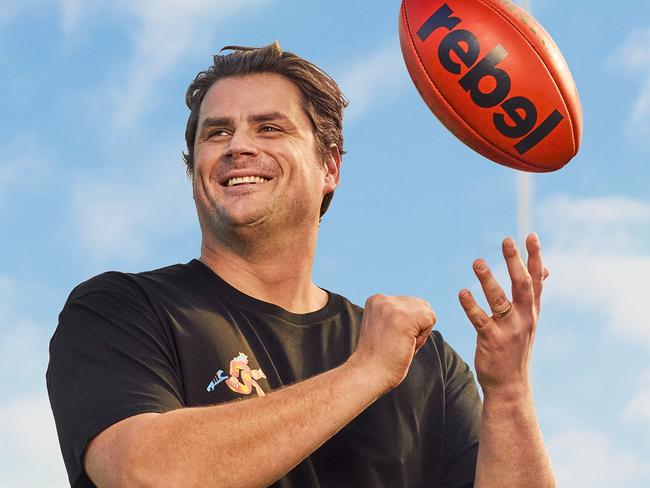
SPREADING THE MENTAL HEALTH MESSAGE
Since his AFL retirement, Boyd has become one of the faces of mental health advocacy in Australia. He has shared his story hundreds of times and even written a book detailing his journey.
This month, he has teamed up with Lifeline and Rebel Sport to launch the ‘Lifeline Collection’, from which 100 per cent of profits will be donated to Lifeline to support its goal of ending suicide in Australia.
Boyd says a constant dialogue around mental health is crucial because “there is never going to be enough doctors, psychologists or psychiatrists to fix this issue on their own”.
“I often talk about how lucky I was to have someone to pick up the phone and just call whenever I wanted, because I know that’s not the case for everyone in regular society.”
Although Boyd was able to successfully switch off from social media, he knows it is not so simple for many people in today’s world.
“Social media is probably the number one question I get asked, around how to help kids combat it and those types of things,” he says.
“I’m not an expert and the principals I follow and will follow with my children are more logic based than anything.
Tom Boyd shares his story ðŸ™
— AFL (@AFL) June 17, 2022
Head to https://t.co/SKNeYTa3XX to get around #SpudsGamepic.twitter.com/2Ja71ceiyF
“There’s just a genuine sense of discomfort and certainly some fear from young parents – including myself – about what the future holds for our children and how they’re going to cope with a society that is drastically different to the one that we grew up in 30 or so years ago.
“When I grew up my perception of success in life and my aspirations were all drawn from the people I saw at my footy club, who were on my street or at my school. They were all within a 25km radius of where I lived. I could dream of playing football on the big screen and that was my goal.
“But for kids today, they will see these incredible one-off stories of kids the same age as them earning millions of dollars … good on them, but for a young mind that sets such a distance between where they’re at and where they could be at.
“That can begin to create an overwhelming sense of lack of worth and a feeling of failure and underperforming – not to mention just talking to thousands of people online can be overwhelming for anyone at any age, let alone a young person.”
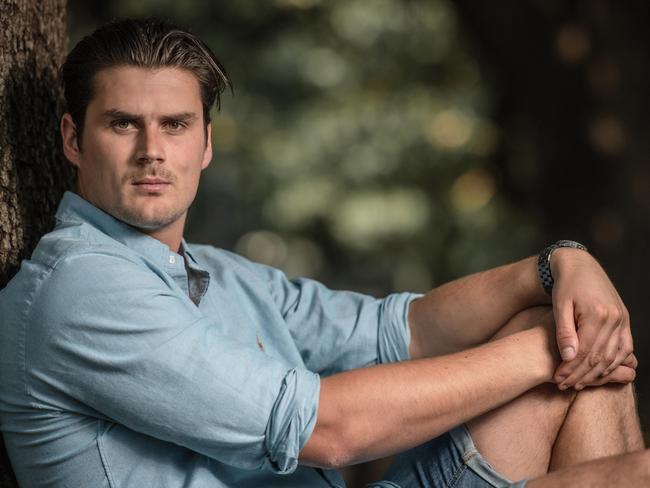
Boyd has spent much of the past five years speaking to people in regional areas of Victoria, New South Wales and Queensland about mental health.
He says outside of the big cities, dealing with isolation is the greatest battle people face.
“The greatest challenge our regional communities have is they don’t have access to the support they need.
“It’s becoming exceedingly difficult for people to get work, to stay close to their family and so on. Suddenly one of the most important structures we have – or immediate friends and family – are things we move away from. The isolation piece is really difficult in regional Australia.”
Boyd doesn’t pretend to have all the answers. He knows the battle is ever-present and ongoing. All he asks is that we keep the conversation going, and let those people who need help know that support is available to them.
“October is a great month just to have an excuse to ring someone and check in on them. People need a nice reminder every now and then. Let this be it.”

Add your comment to this story
To join the conversation, please log in. Don't have an account? Register
Join the conversation, you are commenting as Logout
‘Disappointed’ Giants still backing in Greene despite dirty acts
Stephen Coniglio has backed in Toby Greene’s leadership despite him landing in yet more hot water for an off-field indiscretion, this one well off the ball.
Blues zero in on TDK replacement as Saints flag Marshall intention
Carlton has entered the chase for a fringe big man to bolster its ruck stocks should Tom De Koning depart - but they’re not alone as the annual ruck merry-go-round heats up.